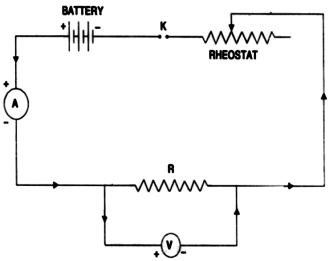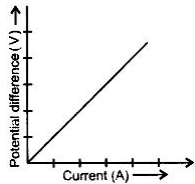Ohm’s law : When the physical conditions such as temperature etc. remain same, the current flowing through the conductor is directly proportional to the potential difference applied across the ends of the conductor, i.e.,
I ∝ V or V ∝ I
⇒ V/I = constant
⇒ V = IR
Where R is constant of proportionality and is called resistance of the wire.
Necessary condition for validity of Ohm’s law is that physical condition such as temperature of the conductor remains same.
Procedure: Experiment to verify ohm's law

Procedure : 1. Connect the various components as
2. Close the sky, so that current begins to flow in the circuit.
3. Note down the potential difference (V) across the conductor PQ of resistance R shown by the voltmeter and the corresponding current (I) shown by the ammeter.
4. Now move the knob of rheostat so that the current in the circuit increases.
5. Again note down the potential difference (V) across the conductor R in the voltmeter and current in the circuit shown by ammeter.
6. Repeat the experiment five times by increasing the current in the circuit by moving the knob of the rheostat in steps
The value of V/I = R (constant) Plot a graph between V and I by taking V along X- axis along. We get a straight line passing through origin.

Conclusion :
- From the graph between V and I, we conclude that I = V, which is Ohm's law.
- Hence Ohm's law is verified experimentally.
- Ohm's law does not hold under all conditions.
- Ohm's law does not hold for non-ohmic material such as electrotyte.